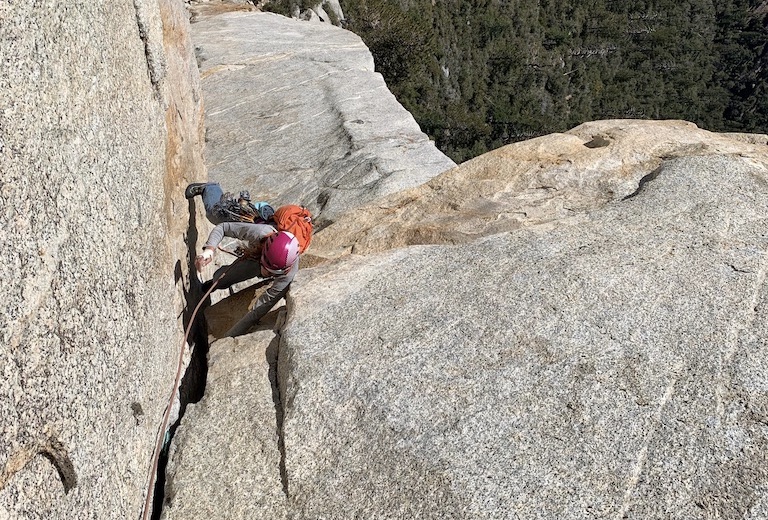OnwardUP was largely founded on the idea that positive outdoor experiences lead to wanting to spend more time in the wilderness. An appreciation for wild places leads to an understanding of the need to protect them.
OnwardUP has taken several steps to use our platform as a business to reduce our own footprint and inspire our staff and community. We have been a 1% for the planet member and have bought renewable energy inputs to run our three offices/showrooms for over ten years.
A couple of years ago we committed to purchasing Gold Standard offsets for all of our road and air travel. We are supporting and inspiring our vendor, retail and community partners to keep pushing their own path to do better for the planet’s environs and people. We hire, first and foremost, based on values alignment and the actions we have taken as a business is therefore a big boost to company culture and a resulting feeling of purpose. OnwardUP rarely loses an employee.
As a leader, I am always wondering how we can innovate. If we aren’t changing and growing (not talking about revenue here, revenue is a by-product) then there is a reason for concern. Last year I created a policy that was certainly the first I had heard of and also one that I was a little nervous would not be well accepted among the team. I created an “Electric Vehicle Policy and Incentive”.
For background that led to this decision, here’s an excerpt from the 2022 OnwardUP Climate Change Impact Statement:
“We believe that we need to be leaders in the changes that are essential to meet the UN Net
Zero Coalition of Net 0 emissions by 2050.
We understand that we need to get to one-half of current global emissions by 2030 in order to
get ahead of the rapid impact of greenhouse gas emissions on climate change.
We believe in the need for investment in new technologies to support innovation and gain
efficiencies in current technology. Wright’s Law states that a 50% increase in investment
equates to a 15% increase in the efficiency of said technology. We need to lead with action
toward this need for investment in new technology by modelling the action needed. If we won’t
do it, who will?
We need to advocate for change and reciprocal leadership amongst our stakeholders.
We will target and challenge our current behaviours and the expectations/norms that our
industry puts on us”.
Here is the meat of the policy.
OnwardUP EV Incentive Policy 2022
OU currently pays at or above the government rate for mileage to our employees. In 2022 this was .59 cents/km in BC and .57 in AB.
Reference Appendix A to view how we will incentivize the transition to EVs.
We are not so much looking to penalize Internal Combustion Engine (ICE) use but incentivize the Electric Vehicle (EV) transition.
OnwardUP understands that the move to an EV has some barriers with expense and convenience.
OU will pay you to drive an EV should you choose to rent or use a company vehicle.
Energy production in Canada by Province: BC is 87% hydro. AB is 36% Coal and 54% Nat Gas. The Transition away from coal by 2023.
The research shows that the cradle-to-grave carbon saving benefit of an EV when charged on coal is even. Meaning if the car was always charged with 100% Coal produced energy then it would be a wash and no carbon reduction. We are already better than that and it is going to get a lot better.
Additionally, 60% of the energy used to move an ICE is lost to heat and friction. A Honda Fitr gets 33 MPG while a Tesla Model 3 gets 141 MPG to show the huge range in efficiency.
Appendix A: OnwardUP Mileage rates
Internal Combustion Engine Rates:
2022: Above government rate.
2023: 100% of the government rate.
2027: 90% of the government rate.
2030: No more ICE use for OnwardUP travel.
Hybrid:
2023: 100% of the government rate.
2032: No more Hybrid use for OU travel.
EV:
2022: 130% of the government rate.
2025: 120% of the government rate. 2030: 100% of the government rate.
Note: if the government of Canada develops a special rate for EV vs ICE vehicles OnwardUP will assess and continue to find a way to incentivize the transition to EV use.
The incentives for EVs are meant to both offset the cost barriers for these vehicles and to support the inconvenience barrier of using EVs.
Should there be an internal option to drive an OnwardUP-owned EV or a rental available in the future, there will be a split of mileage expense where the driver will get 30% of the mileage rate as an inconvenience fee.
Example:
Gov rate = .55.
Driving an EV = 130% of $0.55 = $0.715 cents per km.
Driver = $0.214/km…For every 1000km driven the driver will get $214.00 just for using an EV whether borrowed from the company or rented.
If a personal EV is used the owner of the car pays the charging fees.
If an EV is borrowed or rented then OU Sales and marketing pays for the charging.
** If an EV is available to rent or borrow you may be asked to use this over your own vehicle for road trips where lots of gear is not needed.
EV Purchase Subsidy
OnwardUP will subsidize $10,000 of the cost of a full EV for any full-time employee. This will be paid out in increments of $2500/year as long as the employee is still employed at OnwardUP at the end of the fiscal year (Feb 28/29). The incentive will be a taxable benefit to the employee.
EV Charging Home
TBD: as soon as we have employees charging vehicles at home we will come up with a policy to pay for the charging costs associated with OU business.
Installation of Home EV Chargers: OnwardUP will pay for 100% of the cost of labour and equipment for 1 x Home charging station for each full-time employee. This will be paid out as a taxable benefit over 2 years as long as you are employed at the end of the FY
The questions that came out were largely around the price of EVs, access to EVs, the options for an EV that could fit a boatload of samples or be large enough to sleep in, access to charging, and the fact that many employees already had new internal combustion engine vehicles. All good questions and ones that will be solved over time. We laid out the intention and expectations.
I am pleased to share that the staff at OnwardUP LOVED this move in spite of the questions. I have heard several cases where a few staff are eagerly sharing their enthusiasm and pride with friends and colleagues.
As a leader of the organization, I also felt the need to step up here. I ended up buying an EV this past Fall with the idea of using it both personally and loaning it to the OnwardUP staff in the east for use. Whoever is driving furthest at any period of time gets dibs on the EV.
Would love to hear your thoughts, questions, and dissent.
Rob
Postscript:
I went with a Tesla Model Y. I choose Tesla for a few reasons and had to turn a blind eye to Elon’s recent behaviour. First, Tesla has by far the best charging network. It wasn’t going to work for my staff if we went with anything else. Additionally, it has the best range, was one of the only ones available within a 12- 24 month period (although I expect that forecast to change very soon), and has been on the market the longest (so I could do more research). Happy to answer any questions on how that is going but, while there is a steep learning curve, it has been an amazing experience and I am pretty certain I will never buy another vehicle with an internal combustion engine.














